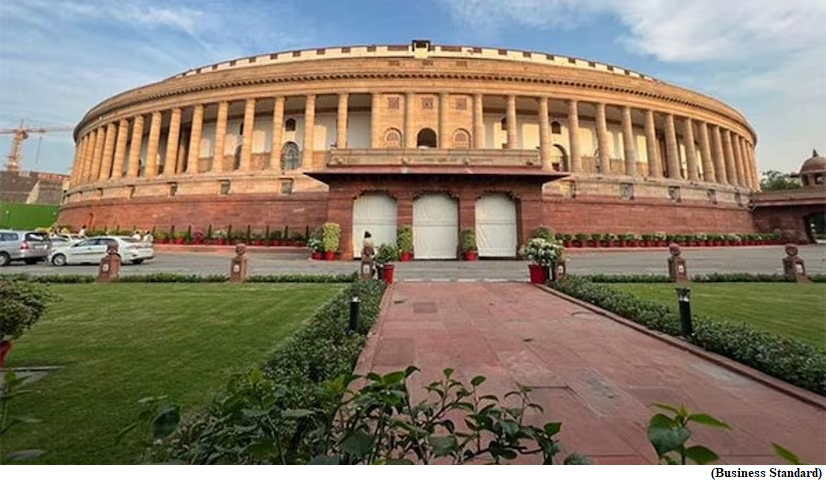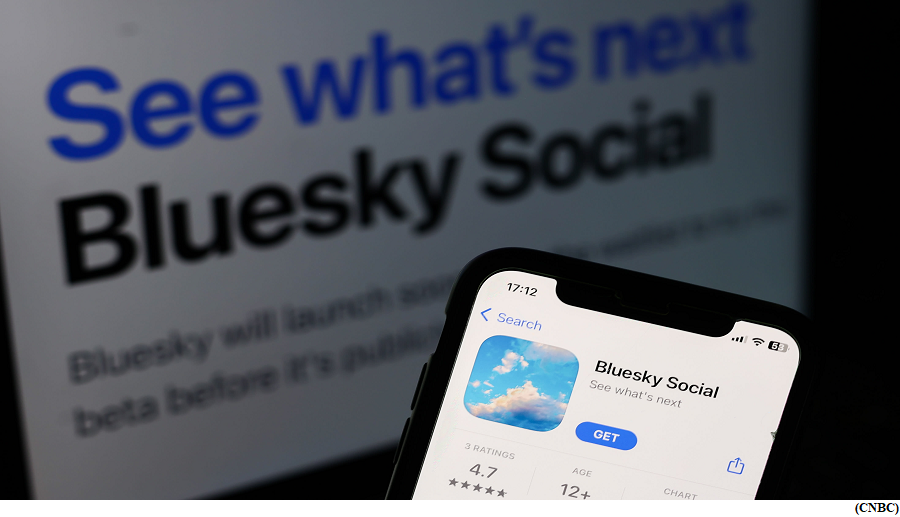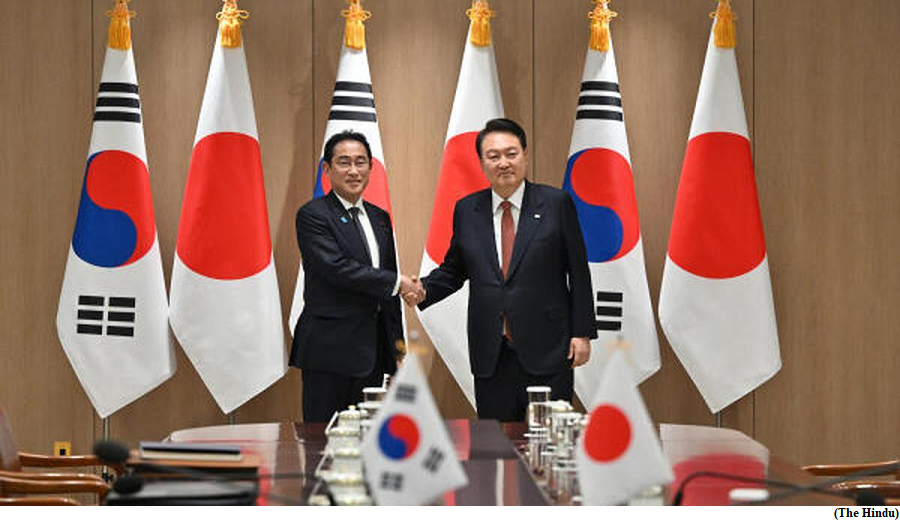42 lost Parliament membership since 1988, maximum 19 in 14th Lok Sabha (GS Paper 2, Governance)

Why in news?
- The recent disqualification of Rahul Gandhi from Lok Sabha has put the spotlight on provisions of an Act which has been used to removed 42 members from Parliament since 1988.
- The 14th Lok Sabha witnessed the ouster of 19 lawmakers in connection with the cash-for-query scam and cross-voting.
- The disqualification of these lawmakers have been on various grounds like changing political allegiances, for conduct unbecoming of a parliamentarian and after being convicted by a court for crimes that have a jail term of two years or more.
Latest disqualifications:
- The latest round of disqualification of Congress leader Gandhi, NCP leader Mohammad Faizal P. P, and BSP leader Afzal Ansari came after their conviction by courts with jail terms of more than two year, invoked the provisions of the Representation of the People Act.
- The Act deals with automatic disqualification of MPs and state legislators upon being convicted and sentenced for two years or more in a criminal case.
- The disqualification of Faizal, who represents Lakshadweep in the Lok Sabha, was revoked after he obtained a stay over his conviction and sentence, in an attempt to murder case, from the Kerala High Court.
- Rahul Gandhi has moved the Gujarat High Court to seek relief in the criminal defamation case involving the 'Modi surname' in which a Surat court had sentenced him to two years in jail.
Earlier disqualifications:
- The first disqualification of a Lok Sabha member after the anti-defection law was enacted in 1985 was that of Lalduhoma, a Congress member, who filed his nomination papers for the Mizoram Assembly elections as a candidate of the Mizo National Union, a party founded by him.
- The ninth Lok Sabha, when the then Janata Dal leader V P Singh formed a coalition government, saw nine Lok Sabha members fall foul of the anti-defection law, which led to their disqualification.
- However, it was the 14th Lok Sabha which saw ouster of maximum members from the House 10 for unbecoming conduct as member for accepting bribe for raising questions in Parliament and nine for cross-voting during the Vote of Confidence sought by the UPA-I government in July 2008 after the Left front withdrew support to it over the civil nuclear deal with the US.
- Six members of the BJP, two from BSP and one each from the Congress and RJD were expelled from the Lok Sabha in 2005 over the 'cash for query' scam. One Rajya Sabha member from BSP too was expelled from the House.
- The expulsions were upheld by the Supreme Court. None of these cases were referred to the President for approving the expulsions since the legislature itself is competent to do so, Devendra Singh Aswal, former Additional Secretary, Lok Sabha.
- The 10th Lok Sabha, when then Prime Minister P V Narasimha Rao led a coalition government, saw four members being disqualified from the House under the anti-defection law.
Disqualifications from Rajya Sabha:
- The Rajya Sabha also has its share of disqualifications under the anti-defection law - Mufti Mohammad Sayeed (1989), Satyapal Malik (1989), Sharad Yadav (2017) and Ali Anwar (2017).
- Jharkhand Mukti Morcha leader Shibu Soren and Samajwadi Party member Jaya Bachchan were disqualified from the Rajya Sabha in 2001 and 2006 respectively for holding an office of profit. While Soren was the Chairman of the Jharkhand Area Autonomous Council, Bachchan was the Chairperson of the Uttar Pradesh Film Development Council.
- A disqualification petition against the then Congress President Sonia Gandhi, for holding an office of profit of Chairperson of the National Advisory Council, became infructuous as she quit as member of the Lok Sabha.
2006 Amendment & afterwards:
- To avoid possible political upheaval, the Parliament (Prevention of Disqualification) Act, 1959, was amended in 2006 retrospectively w.e.f. April 4, 1959 and similar petitions became infructuous.
- A judgment of the apex Court, referred to as the Lily Thomas case, laid down the legal position making it clear that any conviction which carries a sentence of two years or more will automatically result in disqualification of an elected representative.
- The Lok Sabha Secretariat only has to notify the vacancy by issuing a notification so that the Election Commission can start the process for a bypoll.
- As a result of the judgement, Rajya Sabha member of the Congress, Rasheed Masood was disqualified from the upper house due to his conviction in a corruption case.
- RJD supremo Lalu Prasad and JD(U) member Jagdish Sharma were disqualified from the Lok Sabha following their conviction in the fodder scam.
What is Bluesky, the latest micro-blogging platform in the market?
(GS Paper 3, Science and Tech)
Context:
- Since Elon Musk’s takeover, Twitter has been constantly in the news.
- Though the decentralised Mastodon emerged as an early contender, Bluesky has come to the fore as a potential claimant to Twitter’s throne.

What is Bluesky?
- Bluesky is a micro-blogging platform and social website built on the AT Protocol (Authenticated Transport Protocol).
- Bluesky might be classified as a Twitter competitor due to its founding team but it is different in terms of its structure, as it is meant to form part of a decentralised ecosystem.
- Users of apps built on the AT Protocol would be able to move between platforms without losing their followers, media, work, and data. This account portability, as the feature is called, is a major part of the AT Protocol’s structure.
Who is behind Bluesky?
- The CEO of Bluesky is Jay Graber, a software engineer with a background in cryptocurrency. Bluesky was launched in 2019 by former Twitter CEO Jack Dorsey, who chose Ms. Graber to lead the project.
- Twitter and Bluesky were meant to eventually connect and work with each other, but the companies ended their service agreement in 2022.
Could Bluesky replace Twitter?
- Not anytime soon. Bluesky is currently in private beta, meaning that only a select group has been allowed to join via invite codes. Others interested in trying it out can add themselves to a waitlist.
- Regular Bluesky members are also given a new invite code at periodic intervals that they can share with new applicants they deem trustworthy.
What is it like on Bluesky?
- Screenshots of Bluesky profiles retweeted by its CEO show a user interface similar to Twitter, with options to comment, share, or “heart” posts.
- Celebrity users appear to be seeing fewer “likes” and “shares” when compared to their Twitter platforms, due to the smaller number of participants on Bluesky.
- Platform users also have the ability to set their domains as their handle, making it easier to link their accounts across ecosystems, and authenticate their identity.
- While Bluesky aims to achieve a more decentralised structure, it is currently being regulated by an official team and is hosted on a single server.
Japan, South Korea agree to take ties forward in a landmark regional shift
(GS Paper 2, International Relation)
Why in news?
- Japan and South Korea recently agreed to take forward ties and move past lingering historical disputes, pledging to transform a relationship that could have broad implications for the region.
- Japanese Prime Minister Fumio Kishida became the first Japanese leader to visit Seoul in 12 years. The visit followed a trip to Japan in March by South Korean President Yoon Suk Yeol.

Shuttle diplomacy:
- What has been dubbed “shuttle diplomacy” promises to transform ties between two U.S. allies that have been bogged down over historical issues, chiefly Japan’s reluctance to apologise for atrocities committed during its occupation.
- Both have, however, been brought together by shared concerns not only over North Korea’s nuclear programme but over China’s regional muscle-flexing.
March agreement:
- Despite differences over Japan’s wartime actions, which remain an emotive issue in South Korea and China, South Korean President has risked domestic political fallout by making a case for moving forward and arguing that while historical issues continue to be resolved, relations still needed to look to the future.
- To that end, both sides in March agreed to come up with a fund to compensate South Koreans who suffered under Japanese forced labour programmes.
- Under the March agreement, the compensation will be paid by a joint fund, and not, as many in South Korea had demanded, funded entirely by Japanese companies, two of which had, in 2018, faced legal action in South Korea over their record during the 1910-45 occupation. Tens of thousands of Korean women were also forced into sexual slavery by the Japanese Army.
Way Forward:
- South Korean President’s March trip broke the ice, and took forward a rapprochement that both leaders have backed strongly.
- The current visit has seen both sides explore closer economic and defence ties. The Japanese leader also invited South Korean President to the G-7 Summit to be hosted in Tokyo in May 2023, which would have been an unlikely prospect in the recent past.




